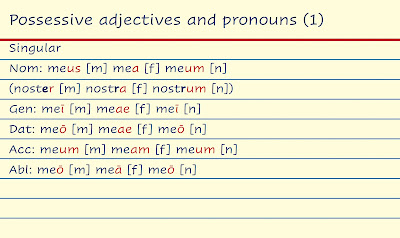Vīlla Cornēliāna
Contentī sumus
fundō nostrō. Vaccae enim lāc et cāseum, gallīnae anatēsque ōva,
pecora carnem praebent. Flūmen etiam, quod praeter vīllam fluit, piscibus
plēnum est. Haec omnia nūllō labōre habēmus, sed sī frūmentum et
vīnum cupimus, multō labōre opus est. Nostrī autem servī fundum
dīligenter cūrant; nam dominum amant, quia et iūstus et benignus est; sī enim
servus laude dīgnus est, et laudem et praemium accipit, sed is quī
indīgnus est sine morā poenās dat.
Apud Claudium
contrā miserī sunt servī; dominus enim ipse Rōmae habitat, vīlicus autem est
omnium hominum iniūstissimus. Servōs enim cottīdiē ferit, neque umquam satis
cibī eīs dat. Eī quī ēsuriunt nōn bene labōrāre possunt. Nōlunt igitur servī
Claudiam dīligenter labōrāre, et quam plūrimī ē fundō aufugiunt.
Eīs enim quī labōrant opus est cibō; eīs etiam qui nōn labōrant cibō
opus est vīvendī causā.
[1] Respondē:
- Quālī pēnsō contentus est magister?
- Quālibus servīs contentus est dominus?
- Quibus rēbus mēnsa magistrī plena est?
- Quibus rēbus nostra camera plēna est?
- Quālibus hominibus nostra camera plēna est?
- Quibus rēbus malum pēnsum est plēnum?
- Quibus animālibus ager est plēnus? Quibus avibus fundus? Quibus animālibus mare?
- Quā rē dīgnus es, sī pēnsum bene fēcistī?
- Quā rē dīgnus es, sī pēnsum male fēcistī?
- Quā rē tibi opus est scrībendī causā?
- Quibus membrīs tibi opus est videndī causā? Et natandī causā (1)? Et ambulandī causā (1)?
- Cūr servī apud Cornēlium libenter manēbant?
- Cūr apud Claudium nōn manēbant?
- Quis nostrōrum rēgum iūstus erat et benīgnus?
- Quis nostrōrum rēgum poenās dedit, quia iniūstus erat?
(1) causā [+
genitive]: for the sake of; on account of; placed after the noun (or,
here, gerund)
videndī causā
│ literally: for the sake of seeking > in order to see
natandī
causā│ literally: for the sake of swimming > in order to see
ambulandī
causā │ literally: for the sake of walking > in order to see
vīvendī
causā │ literally: for the sake of living > in order to live
https://adckl.blogspot.com/2024/10/121224-level-1-topic-school-4-arts.html
https://www.facebook.com/groups/latinforstarters/posts/611381141473158/
[2] uses of the
ablative; find the Latin:
- A slave is worthy of praise.
- We are happy with our farm.
- The river is full of (filled with) fish.
- We have all these things with no work.
- They need food. [ = to them there is need of food]
- Much work is needed. [ = there is need of a lot of work]
- They flee from the farm.
- without delay
Notes
[1] opus, operis
[3/n]: (here) need; necessity
opus esse: to have
need (of something); the person who needs it is in the dative case, and what
there is a need of is expressed either by the nominative case or, as here, the
ablative case.
multō labōre
[ablative] opus est │ a lot of work is needed [ = there is need for much
work]
Eīs [dative] enim quī labōrant opus est cibō
[ablative] │For those who are working need food. [ = To them who are
working there is a need for food.
novō cōnsiliō [ablative] nunc mihi [dative] opus est (Plautus) │ Now I need [literally: to me there is need of] a new plan.
auxiliō
[ablative] mihi [dative] opus fuerat (Cicero) │ I had needed assistance.
[2] Latin uses the
ablative case (categorised under the ablative of means) with adjectives and
verbs that refer to filling something with something or being
filled with (full of) something:
Flūmen … piscibus
plēnum est. │ The river is full of (filled with) fish.
Tōtum montem hominibus complēvit.
│ He filled the whole mountain with men.
Vīlla abundat gallīnā, lacte, cāseō,
melle (Cicero) │ The
farm abounds in poultry, milk, cheese and
honey.
[3] Some
adjectives are followed by the ablative case; these adjectives may be
classified under different uses of the ablative, but it is enough simply to
recognise them:
contentus, -a, um:
content, satisfied
Contentī sumus
fundō nostrō. │ We are content with our farm.
(in)dignus, -a,
-um: (un)worthy
sī enim servus
laude dīgnus est │ for if the slave is worthy of praise
līber, -a, -um:
free (from)
nūdus, -a, -um:
naked; bare; deprived (of)
orbus, -a, -um:
bereaved; bereft (of) e.g. parents; childless, fatherless etc.
vacuus, -a, -um:
empty; devoid (of)
perge hinc ¦ omnī
līber metū ¦ tēque et exercitum servā (Livy) │ march on from here
¦ free from all fear ¦ and save
yourself and the army
Huic trādita urbs est nūda praesidiō, referta cōpiīs (Cicero) │ Rome is delivered to him stripped of protection, stocked with supplies
arce et urbe
orba sum (Ennius) │ I am bereft of citadel and city
vacua dēfēnsōribus moenia (Livy) │ unmanned walls [ = walls devoid of defenders]














